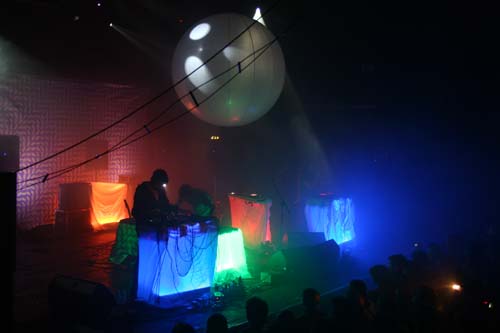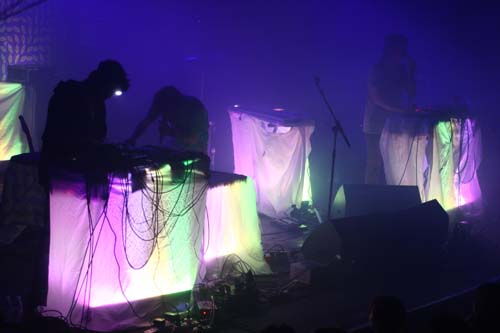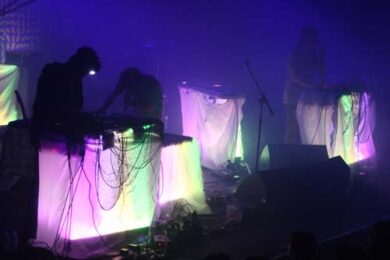Pictures by Maria Jefferis of Shot2Bits.
I learnt a lot while I was in the desert
I was in Arizona twice. I was at the Biosphere II Centre in Oracle, Arizona, which was about 25 minutes north of Tucson, in the South West of the United States. The first time was for five or six months as an undergraduate doing basic Earth Science studies, and then I was there for a full year as a graduate doing a continuation of Life Earth Studies and Earth Science, Climate Change and Environmental Policy, Geology, Oceanography, that kind of stuff, along with a degree in Environmental Public Policy.
You get a different sense of neighbourhood living in such a remote place
The Biosphere was this weird secluded thing, there wasn’t much around so you’re kind-of in the middle of the desert. Well that’s how it felt anyway. People lived in very close quarters with other people, which you do in a city like New York as well, but I seemed to make closer friends in Arizona, living on top of one another, whereas in New York, or basically anywhere else I’ve lived in a city, I’ve felt like I couldn’t stand living on top of people. It pushed me towards complete anti-social behaviour, as it does now living in Washington DC. Because we were all there for the same reason and we were all committed and passionate about the same thing, the sense of neighbourhood and community was the strongest in my life. But at the same time we started noticing how the idea of neighbourhood fits in to society. The South West has these cities where an urban sprawl stretches outwards, and with the advent of mass-producing air conditioners and things like stretches of highways in the 40s or 50s, development happened for pointless reasons. Especially in a place like the South West where basic things like water are in such limited supply. So it got me thinking that, despite living out in the middle of nowhere, but also taking advantage of the development of strip malls and supermarkets on the highway that led out to where I lived, that the ideal way that large groups of human beings should live is in the city for the most part.
You get used to travelling massive distances for the smallest things
It was never a big deal for me to be like, this band I like is playing in Phoenix tonight so I’m gonna drive two hours there and two hours back. Or if I want to go downtown and buy some records today, or I need a new pair of pants or something, you drive 45 minutes in one direction. You spend hours in the car. I come from an environmental background and I’m passionate about this kind of stuff, but being part of that world where development pushes means you just have to stop thinking about the fact that you’re going to spend three hours in the car to go and get a sandwich or something.
Phoenix and Tucson aren’t like other cities
Baltimore [where Animal Collective formed] felt like there was a centralised town compared to places like Phoenix and Tucson, and then within ten minutes you could be beyond the suburbs already, in the countryside. To me, I like that sort of planning a bit more. A lot of the cities on the East coast aren’t like that, and even Baltimore isn’t like that in most directions, it was like that in the very specific direction that we lived, which was directly North of the city. With Tucson and Phoenix, there almost is no downtown; it’s like Los Angeles. All the South West towns are sprawl, sprawl, sprawl. I really hate it.
Native American reservations have a lot of problems that go unnoticed
Navajo and Apache reservations in America are pretty bad places. They’re all turning to gaming to increase revenue, but the amount of revenue they get from the state in taxes is very low There’s a lot of alcoholism and they police themselves. I spent a lot of time around the reservations and driving through them. I got a speeding ticket, which everyone said I wouldn’t even have to bother paying because once you’re out of the reservation they have no jurisdiction… I paid it anyway.

Living in the area can affect your health
I studied cancer clusters in Tucson and focused on a different population, the minority. It’s weird to say that Hispanics are the minority, but they’re still the poor part of society. The big Mexican and Hispanic neighbourhood is down by the airport in Tucson. They use this chemical called TCE, a solvent to clean metal parts, and for years in the 80s before the advent of environmental law and superfund sites it was just dumped on the ground. It made its way into the plume that goes from the airport to the groundwater. It was welled for the community, and there is a cancer cluster there. It’s been hard for people to prove that it’s a result of the airport, but it seems plain as day to most people that study epidemiology. So we would go as part of a study with the University of Arizona where we’d go and just knock on doors and try and conduct a survey of how many people, their drinking water habits, how much they drink from the tap, and then talk to them about the history of cancer in their family or if they, or anyone in the household had cancer. I think the study’s still on-going and I’m not sure if the results are published but, it was just in an effort to prove that this cancer cluster is beyond the probability of chance.
With increased amounts of visitors to areas like the Painted Desert and various National Parks, conservation and tourism must strike a balance
I’m a big Scuba Diver. There’s some compromise you have to make in terms of dropping a boat anchor on a reef or something. I think it’s a very site-specific sort of thing. I don’t think there are any two parks the same, and I’m not like Edward Abbey who wrote about a lot of those parks in the South West and said they should remain completely road-less so it’s only the dedicated people that would hike there – I don’t go that far, I think it’s important that some people do see them and they would never do it if there wasn’t some kind of easier access. Me and my girlfriend did a road trip in Northern Sweden, and I remember feeling frustrated because we only had a week or two and we didn’t really show up with the idea of serious back-packing or whatnot. But most of the parks up there are completely road-less and it was a bummer not to be able to see them, so I’ve experienced both sides.
The storms and sunsets are amazing
The best is when they happen together. The storms are never like monsoons where I lived, the Biosphere was 4,000 ft higher than the basin where Tucson is. On most days you could see far down into the basin because we were up in the foothills of the mountains, and you could see the thunderstorms. They were these really intense, violent, but very centralised things with different parts. At sunset you could look out at the basin and see that there’s a thunderstorm, but then the sunset comes through and then there’s another thunderstorm over there. The diffraction of the light when there’s moisture in the air becomes even more intense, it’s a pretty magical moment. It only happens for a few weeks a year. All the tarantulas come out after sunset when it rains.
Hippies did a lot for the area
The Biosphere was created by a sort-of hippy cult. It’s used now by universities for climate change research, but those hippy people still hang around. The town that it’s near is populated by a lot of ex-Biosphere people, they have a Harvest Festival every year that I worked at one year as a barbecue chef. I don’t mind to be called a hippy, it doesn’t turn me off completely – so long as I can have a normal conversation with people. There were some arts ranches out in the desert, it doesn’t bother me so much to be part of that.
I’m not sure I’d go back there
I talk to my girlfriend about this [moving back to the desert], because we talk about where we might want to settle. I do really love it there, it’s one of those places where as soon as I get off the plane, or get out of the car if I drive there something totally happens where I feel at home, and your insides swell up. But I have a problem with being really far from the ocean.
Ultimately, people aren’t supposed to live in the desert
I truly believe that human beings in mass should not be living in environments like that, because they do nothing but destroy it. There’s no benefit to us being there… except getting a tan or something, maybe solar energy. Tucson is dealing with the fact that their water supply is supposed to only last for another 20 years or something, so they’ll have to divert another river to the city. There are no wild rivers left in America, every single one of them has a dam on it, mostly because people live out West and they shouldn’t.



